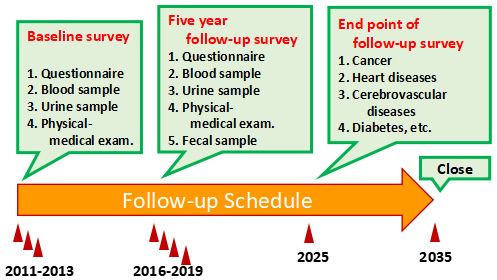Public Health

- account_circleKiyonori KurikiPhD, Prof.
- Website:https://dfns.u-shizuoka-ken.ac.jp/labs/phealth/
- Mail:kuriki@u-shizuoka-ken.ac.jp
- Phone:+81-54-264-5563
Nutritional epidemiological studies
Seeking to achieve the highest standards in nutritional epidemiological studies on the prevention of lifestyle-related diseases and the prolongation of health longevity
- 1. Nutritional epidemiological studies on the prevention of lifestyle-related diseases and the prolongation of health longevity
We aim to achieve the highest standards in nutritional epidemiological studies, and pay special attention to examining multilateral relationships between dietary food/nutrient intake and the risk of lifestyle-related diseases, such as cancer, coronary heart diseases, hypertension, dyslipidemia, and diabetes mellitus.
- 2. Clinical-epidemiological studies using biomarkers of specific food/nutrient intakes (J-MICC Sakura diet study)
The mission of our laboratory is to more fully understand the interactions between lifestyle-related diseases, drug treatment, and dietary food/nutrient intake, using the appropriate biological makers in blood and urine.
- 3. The Japan multi-institutional collaborative cohort study (J-MICC Study)
To further assess gene-environment interactions of lifestyle-related diseases, the J-MICC Study is supported by a research grant for Scientific Research on Special Priority Areas of Cancer from the Japanese Ministry of Education, Culture, Sports, Science and Technology. Our collaborative work is based in the Shizuoka-Sakuragaoka area. Visit http://www.jmicc.com/en/(in English) for more information.
- Figure 1
- The J-MICC Study. We investigate baseline-data from study participants who receive an annual health checkup or a periodic medical examination in Shizuoka-Sakuragaoka area.

- Figure 2
- The following chart shows the schedules for the J-MICC Study
in Shizuoka-Sakuragaoka area from the year 2011. 
References
- Nat Genet. 2020;52(11):1169-1177. doi: 10.1038/s41588-020-0705-3.
- Nat Commun. 2020;11(1):3175. doi: 10.1038/s41467-020-16711-w.
- Ann Rheum Dis. 2020;79(5):657-665. doi: 10.1136/annrheumdis-2019-216644.
- Nat Genet. 2019;51(3):379-386. doi: 10.1038/s41588-018-0332-4.
- BMC Nutr. 2019;5:61. doi: 10.1186/s40795-019-0315-6.
- BMC Womens Health. 2019;19(1):33. doi: 10.1186/s12905-019-0719-0.
- Asia Pac J Clin Nutr. 2019;28(1):79-91. doi: 10.6133/apjcn.201903_28(1).0012.
- Arch Microbiol. 2015;197(7):919-34. doi: 10.1007/s00203-015-1125-0.